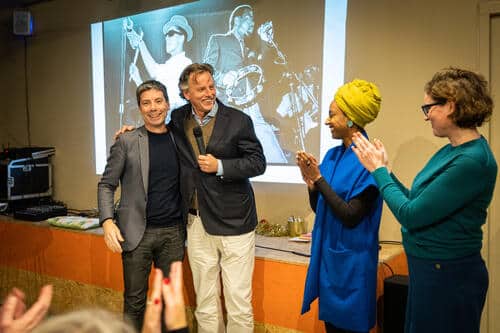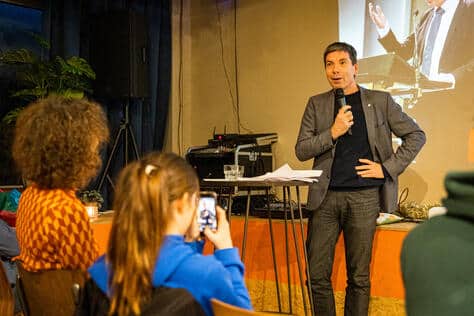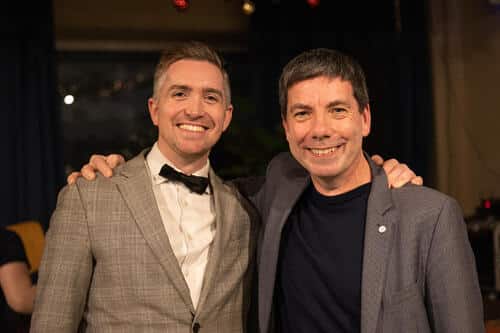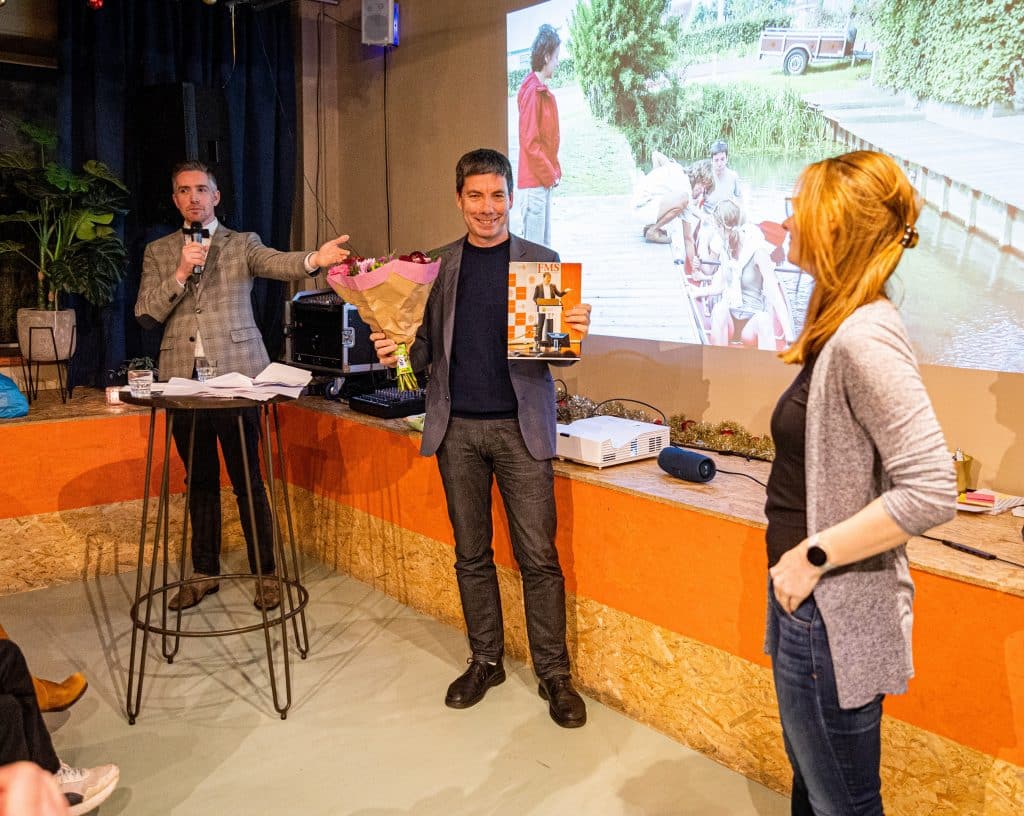After more than 20 years, Arjen Berkvens is leaving his position as director of the FMS for a position as coordinating confidant at the University of Amsterdam. He sat down with Sofie and Mathieu one last time for a farewell interview about his work and experiences at the FMS.
Arjen graduated as a historian of non-western history in 1993. Having no idea at the time what he wanted to do, Arjen decided to start as an intern at the Alfred Mozer Foundation (AMS, predecessor FMS) in 1994. After his internship, he became project manager, and for 10 years he was mainly involved in the Central Europe region (Czech Republic, Poland, Hungary). In 2003, Arjen became director after a tumultuous time for both the Labour Party and the FMS. Arjen looks back on this himself: "The PvdA collapsed after the Melkert election campaign in 2002 and, as a result, the AMS also immediately had much less money. So much so, that we then had to decide to lay everyone off. However, Balkenende's first cabinet soon fell. Meanwhile, I had become interested in campaigns. In 2003, the PvdA went into the new election campaign with Wouter Bos, and I was one of his two advisers. We rose to 42 seats again then, and as a result we as AMS also suddenly had enough money again. But the director had left, so then I said: 'then you should make me director too'". And so it happened.

Arjen with, from left to right, FMS board members Bert Koenders, Milka Yemane and Kirsten Meijer
Over 20 years of work by Arjen & FMS
In 2011, Arjen was asked to also become director of the Evert Vermeer Foundation (EVS), also a predecessor of the FMS, but in this case focused on development cooperation and known for Africa Day and Fair Politics. It was his idea to merge these foundations: "Development cooperation, foreign affairs and democratisation became increasingly intertwinedand. And then I said 'to go along in those changes, it is also obvious to start working on that merger'. In the end, we managed that". Arjen still considers the merger a success. "It was kind of born out of necessity, but I think the distinction between development cooperation on one side and democratisation on the other is nonsensical. In the world of international cooperation, those things intertwine. At Building Change you see: Policy coherence you also have in democratisation. How do you conduct honest politics and empower people and societies? Those are the themes we are working on as FMS. So I would definitely do that again."
Quite a few countries where the FMS was active became part of the EU during your time as FMS director and also more democratic. How do you look at your contribution, do you see that as a success story?
"Some of the parties we worked with have a very important played a role in the expansion [of the EU]. Connecting those parties with our networks, the European Parliament and political parties in Brussels has been important in moving towards the European Union. I think we laid one of the building blocks in building a relationship with those countries. For instance, we supported social democratic parties, which had been underground since the 1930s. In the Czech Republic, that party consisted of only older gentlemen. We helped them build their re-established party."
It has always been very important to Arjen that the FMS was demand-driven. "We have always said, 'the question has to come from there'. In the beginning it could be a stencil machine or a fax machine and later it became "how should we actually campaign, how should we build a party?" With that demand-driven work, Arjen says you avoid an unequal working relationship. "Because we always remained demand-driven, I never really felt there was a power differential. I did always see it as a risk. There is always inequality the moment we pay, and they receive. But the fact that we are all members of the same social democratic movement means you have equality at that level."
A continuous theme in your work is EU enlargement. The war in Ukraine has put the integration of Eastern Europe and the Western Balkans into the EU back on the map. What are your hopes and expectations for the EU integration process, a big theme at the FMS?
"I hope it will eventually work out, but I expect it could be a very long time before those countries have the opportunity to actually become members. There are a lot of political dangers lurking and a lot of resistance. I have seen it change from an enormous political will to expand that European Union, in the 1990s in particular, to an enormous political unwillingness. And because of Ukraine, there seems to be a bit more political will again, but I don't think it's really lived through.
What are you most proud of when you think of the FMS?
"What I am most proud of is that we as FMS have achieved a certain standardd put down and play a certain role. That we are always looked at first when something needs to be done together. That was already the case when I came here - my predecessor, Berend-Jan van den Boomen, also had that. On the one hand, it is important to be modest, but on the other hand you have to be able and willing to play that brokerage role. Connecting people and occasionally also just daring to take risks."
At the FMS lunch, geopolitical topics are also discussed daily. Do you enjoy that?
"I definitely enjoy that! And of course that's a difference from the UvA, where we hardly ever talk about politics. On the contrary, there it's often about other things. The topics never mattered much to me. It's just fun to talk to people about social and political issues. And the fact that I often sat at the table with the "next generation" I always really enjoyed."

Arjen gives his farewell speech in front of his family, friends and colleagues.
Arjen's experiences at the FMS
After 28 years with the FMS and its predecessors, Arjen has obviously experienced a lot. And every day - said Arjen in his farewell speech - he went to work with pleasure. Asking how he has always enjoyed his work at FMS, Arjen answers: "That whole world of international developments has always attracted me enormously. Such a war in Ukraine is of course terrible, but you also know exactly what it is about, because you know people there, you have a personal bond with them. The fact that you can experience developments like that from very close quarters, and that you could also work with a lot of beautiful and good people nationally and internationally, that has always given me a boost." Also, Arjen has undertaken many things besides the FMS. For instance, he did election campaigns for the Labour Party for 5 years and was involved in setting up the European Network of Political Foundations (ENoP), where Arjen was also chairman for 2 years. From that diversity of work, Arjen reflects: "To my mind, it was not one job," he said.
When we reflect back on the best moments from Arjen's time as FMS director, it quickly turns to certain trips that made a deep impression on him. Especially when it coincided with important international developments: "Serbia right after the Otpor revolution. That people who fought for years, and with whom you worked for years, are suddenly ministers. And that you are then shown around the ministry there in Belgrade by someone who has become a minister from your sister party. Who opens a door and says: 'Arjen, have a look', and behind it everything turns out to have been destroyed by a NATO bombing."
There are countless other anecdotes about Arjen's trips abroad. After the Orange Revolution in Ukraine, the former opposition party had suddenly become the ruling party. Arjen went to visit afterwards and experienced completely different treatment as before: "I came down the aircraft stairs, and was met downstairs by someone who took care of my luggage. I was put in a van and driven somewhere, and I took a seat in a waiting room. There sat a man. I introduced myself, 'Arjen Berkvens', and he replied 'General Wesley Clark, nice to meet you'. Then all of a sudden you are sitting in a waiting room with a US presidential candidate and former NATO commander because you have been invited by the country's new leaders. Those are crazy moments where you think, 'Who am I?'"
Are those also the trips that made the most impression?
"Yes. But you know what the beauty of this work is. You come somewhere for the first time, and you always have and idea of what it will be like, but that's never what you find. That you are overwhelmed by a new culture. I think that's the most beautiful thing there is. I remember the first time I was in St Petersburg, which I think was in 1995. All my life I had grown up with the idea of the Cold War, the Soviet Union. And then suddenly you're driving around there, that's a very overwhelming feeling, to be able to experience that."
There have undoubtedly also been a lot of poignant moments with partners going through difficult times at times. What are the stories that have stuck with you the most?
"I have always found it incredibly brave when people take the uiterst consequence could accept their activism. I have been in touch with Statkevich's party for 25 years [Belarus]. That one has been in jail for 20 years. That one has been through everything, it's really unbelievable. And he keeps going. And the same goes for the young people in Serbia and Ukraine that we brought together after the revolution in Serbia. We then brought Serbian people to Ukraine with the idea: 'You can learn more from them than from the Dutch'. The people from Serbia said: 'If you are serious about changing something, you have to take the personal consequences as well, and that means you can go to jail, that means you will be kicked out of university, that means you will have family problems, that means you are not allowed to have fear anymore'. People who could live up to that... I always wondered 'could I do that in such a similar situation?'"
Do you believe it is possible to have no more fear?
"The Serbs used to say 'from the moment we stopped having fear, we could change something'. I think everyone will always have fear. And over the years, the dictators have learned from that toord. You'll be an activist in Iran, or Afghanistan. I don't know what I would do. And also now the moment war breaks out in Ukraine, and I keep in touch with the people there, especially of course with Bohdan. I had him on the line at the start of the Russian attack when he was in a traffic jam heading west and had no idea what was about to happen. The invasion had just happened and people were fleeing en masse. I found that very intense and also that this was happening in the last year I have been working here. Of course you want to help, but it also really affects me personally. I then thought, 'Let's at least do something'. Then we started collecting money first, and then goods as well. For them, the solidarity you show with that is the most important thing. That's really on a personal level."
Despite such poignant events, Arjen did not find working as director very difficult. However, he did find the Labour Party's seat loss difficult, with the financial consequences for the foundation also coming into play. "But I have always tried to release creative energy just then. In the Herengracht era, at one point there were more than 100 colleagues at the party bureau. When that completely collapsed, many Labour colleagues had to leave, which was very tough. I am proud of the fact that we did manage to keep all the FMS people on board then by taking lots of new initiatives." Under Arjen, dependence on grants was significantly reduced, partly by creatively bringing in other funds. "A crisis also leads to creativity and innovation."

Changing of the guard: Arjen with Kido Koenig, the new director of the FMS.
The future
In this interview, we not only want to look back at Arjen's time at the FMS, but also look ahead to the future. How does he see his new position at the UvA and the future of the FMS?
You have since started working at the UvA as coordinating trustee. What are the similarities between your old and new work?
"For me, the most important thing anyway - as I also said in my farewell speech - is that the FMS's motto is to empower people and make politics fairer. And in fact this is also true in my work at the UvA. Make people stronger, make people more resilient, make sure people are not ground down by the system. But they have to be able to stand up for themselves. And political fairness, which I also see more broadly; the system has to be fair. That's what I like about policy coherence, which is also about fair politics. For me, these are the same values that are important there [UvA] and here [FMS]. It is my personal motivation; I find it hard to stand injustice. Regardless of whether it is on a global scale or on an individual level."
For many people, it will be difficult to see Arjen and the FMS separately. For the past month and a half, you have handed over the job to Kido Koenig, our new director. What would you like to pass on to him?
"At the time we are in now with the FMS, you really need a Kido. He has a lot of energy, a lot of drive for innovation and a huge imagination. I come from a more thoughtful context anyway. My frame of reference is that the Labour Party has always had a third of the seats and has always played an important power role. Current times are different. I do sometimes struggle to accept that the world has become totally different.
And further, seize opportunities where you can seize opportunities and keep your eyes open for that. And what I have always done is give opportunities to the people who work with you. Understand that too, and understand that it is important to have a mixed team with different perspectives. But above all, make sure people come into their own by giving them a lot of responsibility."
How do you envisage the near future of the FMS?
"In any case, one thing is certain: the FMS is still desperately needed. Around themes in international cooperation, but also in the relationship with our neighbours. On democracy in the EU but also outside the EU. We already said in the Thessaloniki agreements: 'the Balkans must not become Europe's black hole between Slovenia on the one hand and Greece on the other. These are our immediate neighbours, they must belong to the Union. As long as that is not settled, I think there should also be an FMS.
In addition, you have to be rock solid in committing to change our own behaviour. Policy coherence is fortunately increasingly recognised. We have always been a huge forerunner on that. The idea is: we can contribute by changing our own behaviour. Behaviour that has a negative impact on others. And that, in my view, is the fairest form of development cooperation. The form of development cooperation, where we in the West all come up with projects based on priorities that we have thought up ourselves, I've never had much with that."
Arjen, it is no secret that you are a big fan of AZ Alkmaar. But you have also remained very loyal to the Labour Party all these years. So surely the most important question of this interview is: Where does your loyalty really lie? We will test this using the following proposition: either the PvdA will get 30 seats in the next general election or AZ will be champion in the next 10 years. What will you choose?
"Then I'll go for those 30 seats anyway. In those 10 years, I think winning the championship once is enough. Becoming champion every year is also a bit boring, so just give me those 30 seats. I'm afraid of what my son will say when he hears this, though."





